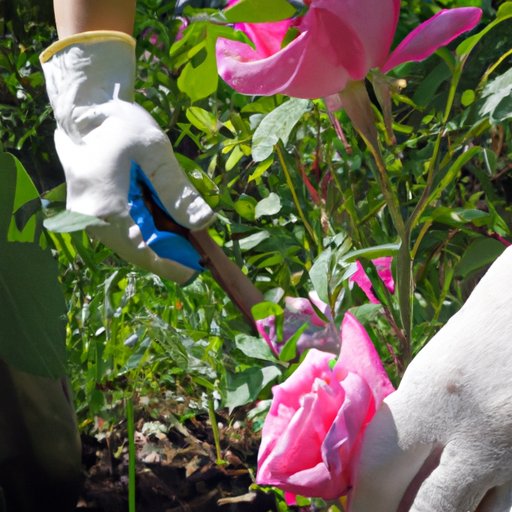
I. Introduction
Roses are known for their beauty and luxuriousness, but their upkeep may present a challenge for even the most seasoned gardeners. Roses require specific care guidelines to increase their lifespan and maintain their beauty. In this article, we will discuss the essential factors to consider when caring for roses, including watering, soil maintenance, fertilizing, pruning, monitoring, and seasonal changes. Beginners and experienced gardeners alike will find these tips helpful in ensuring the longevity of their roses.
II. Researching Before Buying Roses
It is crucial to research the plant’s fundamental needs before purchasing roses. The sunlight, environment, soil type, and rose variety are some of the factors to consider when determining the best roses for your surroundings. For example, roses that require full sunlight may not grow well in shady areas, whereas those that thrive in more temperate climates may wilt in intense heat. It is also essential to select roses that complement the soil, temperature, and humidity of the environment in which they will be grown.
III. Watering Roses
Roses require consistent watering to maintain their health and vitality. Overwatering can lead to root rot, while underwatering can cause the plant to wilt and die. To avoid drowning the roots, avoid watering roses with a hose for an extended period. Rather, water roses at the base and provide enough water to soak the soil thoroughly. To increase the lifespan of roses, water them at regular intervals, preferably in the early morning or late afternoon.
IV. Soil Maintenance
The type of soil you use and its level of fertility play a crucial role in the health and longevity of roses. Roses grow best in well-drained, fertile soil that does not retain too much moisture. It is recommended to use soil that is rich in organic matter, such as compost, as it will help with drainage and moisture retention. Be sure to fertilize the soil every year and keep it weed-free to ensure that roses have ample space and nutrients to grow.
V. Fertilizing Roses
Fertilizers play an essential role in feeding roses with the necessary nutrients they need to grow and bloom. A balanced fertilizer that contains nitrogen, phosphorus, and potassium is optimal for roses. Fertilizers should be applied early in the growing season and again after the first round of bloom. Too much fertilizer can harm the plant, so always follow the recommended instructions for the quantity and timing of application. With adequate fertilization, roses can grow strong, resist diseases and pests and live longer.
VI. Pruning Roses
Pruning roses is a necessary task as it promotes vigorous growth, maintains the plant’s shape and size, and encourages steady blooming. To keep the rose healthy and nourished, pruning should involve removing any dead or decaying stems that could cause problems in growth. Other stems that do not adequately contribute to the plant’s structure should be removed and pruned. Pruning should be done after the blooming season and every few weeks during the growing season.
VII. Monitoring the Growth of Roses
It is essential to regularly monitor the growth of your roses, as any shortcomings that arise can be addressed before they cause major problems. Keep an eye out for signs of pests or diseases, including wilting or discoloration of the stems or leaves. By monitoring and addressing plant problems early on, you can avoid the spread of diseases and enhance the lifespan of the roses.
VIII. Seasonal Changes
Roses are susceptible to changes in temperature, light exposure, and humidity. As a result, they require different care in different seasons. During the summer months, watering more frequently is essential. In the winter, keeping the plants well-insulated from harsh weather conditions can protect them from damage. It is also vital to use compost or other soil amendments to nourish the soil during the fall season. By taking these precautions, your roses can survive seasonal changes and continue to thrive year after year.
IX. Conclusion
Caring for roses can be a tricky task, but with careful attention and consideration of these essential guidelines, you can ensure the longevity of your roses. Be sure to do proper research before buying roses, water them regularly, maintain healthy soil, fertilize appropriately, prune regularly, monitor growth, and address problems early on. Finally, keep in mind that roses require different care during different seasons, so adjusting their surroundings accordingly is essential in maintaining their health for years to come.





